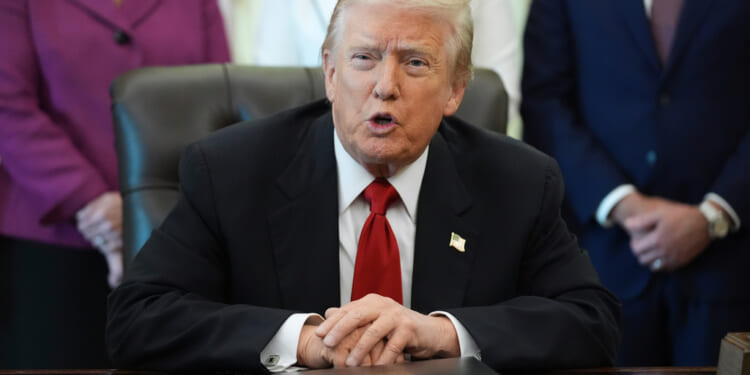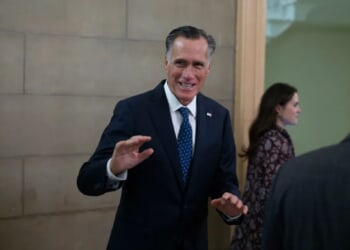Following Trump’s Oval Office announcement Thursday about drastically lowering costs for Ozempic and other GLP-1 drugs, MAHA leaders told the Washington Examiner that they would prefer to see an elevation of holistic medicine and improved nutrition quality, rather than pharmaceuticals, as the way to end the obesity epidemic in the United States.
Jennifer Galardi, policy expert for the Restoring American Wellness initiative at the Heritage Foundation, told the Washington Examiner that she thinks making GLP-1 drugs more accessible and cheaper is “philosophically incoherent” when touted alongside MAHA’s core tenet of holistic and diet-based medicine.
“In my eyes, it works against the message of the MAHA movement, which encourages root cause treatment to curb chronic disease spending,” said Galardi.
Trump and Health and Human Services Secretary Robert F. Kennedy Jr. announced that the administration had struck a deal with pharmaceutical giants Novo Nordisk and Eli Lilly, pioneers in the GLP-1 drug class targeting obesity and Type 2 diabetes.
According to the White House, the prices of Novo’s Ozempic for diabetes and Wegovy for obesity and cardiovascular disease will fall from $1,000 and $,1350 per month respectively to $350 when purchased directly from the manufacturer via the TrumpRx platform to launch early next year.
The administration also announced that Medicare will cover anti-obesity medications for individuals with a BMI greater than 27 with other comorbidities, such as heart disease or prediabetes. The Medicare price will be $245, and beneficiaries will have a $50 copay.
GLP-1 medications have revolutionized treatment for obesity and diabetes. Under certain conditions, certain GLP-1 medications have also been proven to be helpful in managing or reversing heart disease and chronic kidney disease, as well as reducing rates of stroke and heart attack.
Kennedy, who in the past has been staunchly against praise for Ozempic, during the press conference on Thursday said that GLP-1s are “not a panacea” but are an essential tool for the MAHA agenda.
The HHS Secretary, who started the MAHA movement during his presidential campaign in 2024, called obesity a “disease of poverty” and said improving access to the medication will help people living in food deserts who “are locked into that system where they can only get ultraprocessed foods, which are aggravating the problem.”
But Galardi said that, from a philosophical perspective, the move “affirms that obesity is a disease that somehow just happens to you that requires medication rather than a result of poor choice and poor education.”
By contrast, American Medical Association President Dr. Bobby Mukkamala in a statement Thursday afternoon praised the Trump administration’s move as a “transformative step in the battle against chronic disease and obesity.”
“Obesity is a complex disease that requires evidence-based treatment. Expanding access to effective therapies such as GLP-1 medications represents a significant step forward in confronting an obesity epidemic,” Mukkamala said.
MAHA advocates did argue, however, that they supported the general thesis of the Most Favored Nations policy, bringing American drug prices in line with those of other countries.
So far, the Trump administration has made five Most Favored Nation deals with pharmaceutical companies to create parity between US prices and those of other ODEC countries.
Kelly McKenna, CEO of the wellness non-profit End Chronic Disease, told the Washington Examiner that her organization would rather the administration concentrate more resources toward addressing the root causes of obesity with improved nutrition, but GLP-1s should be in reach in the meantime.
“Health is not a luxury. GLP-1 therapies have shown promise in helping to manage chronic diseases like obesity and heart disease, especially when paired with root-cause interventions such as nutrition and lifestyle changes,” said McKenna. “Expanding access to these life-changing treatments is a vital step towards a fairer, healthier America.”
Galardi said that MAHA’s goal of overhauling the healthcare and food systems in America is going to be a long process, and, while long-term changes are underway, necessary medications to fight the obesity epidemic should be accessible.
“For as long as people still need pharmaceutical drugs for chronic health conditions, we shouldn’t be paying more for these than the rest of the developed world,” Galardi said, adding that the healthcare system ought to steer patients toward “choices that get people off those medications all together.”
MEDICAL SCHOOLS BOOST NUTRITION EDUCATION IN RESPONSE TO RFK JR.
“Even at lower prices, our current health care model is unsustainable and does not incentivize healthy habits while it encourages poor ones,” Galardi said.















